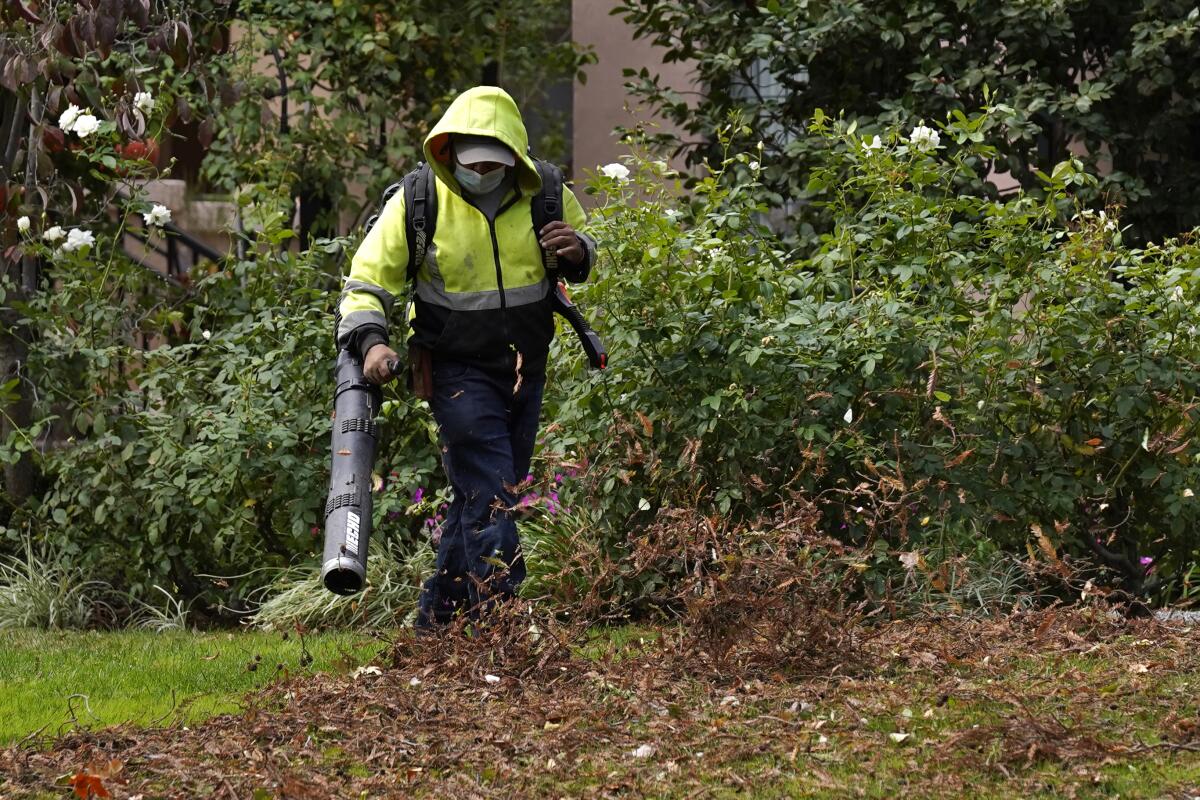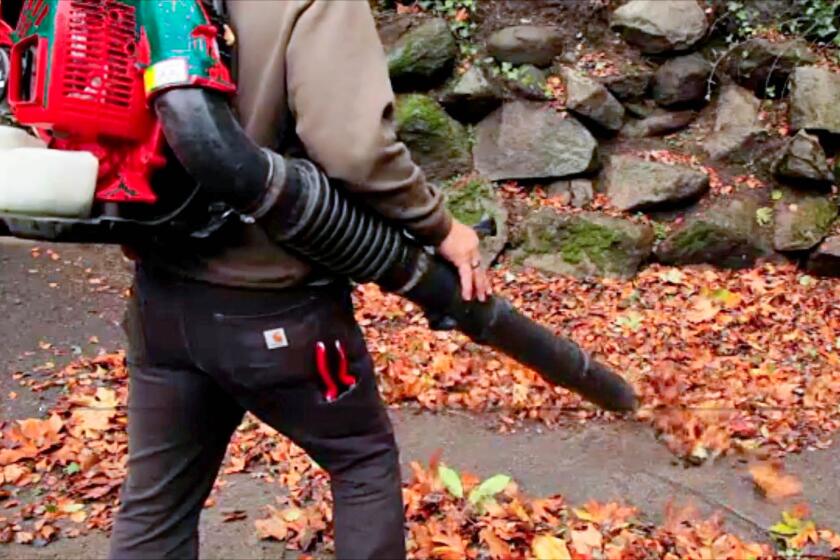Column: Add this to the list of things I’ll never miss: The gas-powered leaf blower

A gardener uses a leaf blower in Sacramento. A California law will institute the first ban on the sale of new gas-powered leaf blowers.
- Share via
If a genie gave me three wishes, I swear I would ask for world peace, universal healthcare and the demise of gas-powered leaf blowers.
Like so many people, I work at home. I don’t have a gardener, but I am surrounded by neighbors who do. And every week, without fail, their men arrive armed with leaf blowers, swinging them like, um, elephant trunks and shattering my nerves.
On the property next door, an apartment house, there are exactly zero leafy trees. The only “landscape,” if you can call it that, consists of a carpet of small white rocks with a few spindly palms bordered by a low hedge. There are no leaves to speak of, so every Monday the gardener reverse-vacuums the ground-floor parking garage, blowing dust, sand, cigarette butts and other debris toward my house. God help me if I forget to close the windows.
On the other side is a single-family home with a postage-stamp-sized frontyard. A few small saplings line the fence between our homes, and there is a lovely bougainvillea on the other side. Every Friday, a two-man crew descends, toting an earsplitting blower. The men wear noise-canceling headphones and masks, and yell to make themselves heard over the roar. Until they leave, I can’t talk on the phone, listen to the radio or hear myself think.
Why are these things still in use? Years ago, in the late 1990s, Los Angeles banned gas-powered leaf blowers.
The initial ordinance — mandating $1,000 fines and up to six months in jail, was so harsh it ignited a grass-roots uprising among the city’s mostly Latino gardeners. They formed the Assn. of Latin American Gardeners of Los Angeles to fight it. On the lawn of City Hall, more than a dozen gardeners launched a seven-day hunger strike. They drew hundreds of supporters, who chanted “Si, se puede!” and carried signs reading “We have a right to make a living!”
The hunger strike ended peacefully after city officials promised in writing to help find legal substitutes for the ubiquitous gas-guzzling machines. And the City Council agreed to weaken the penalties.
“Our influence has grown,” said strike leader Adrian Alvarez. “We gained what we wanted: that they take us seriously and begin a dialogue to find a better solution.”
Currently, the law carries a maximum fine of $100 for both the gardener and the homeowner, though I have never heard of anyone receiving such a ticket.
Gardeners had every right to be angry and to flex their fledgling if fleeting political muscle. By ethical standards, the law seemed to be an attack on the livelihoods of many of the city’s poorest laborers. The conflict seemed to pit the struggles of the working poor against the callous desires of affluent and mildly inconvenienced homeowners. As the years wore on, though, it became apparent there was more to it than that simple, reductive take.
By environmental and health standards, the ban was good policy.
The blowers, after all, are prodigious polluters.
“Two-strokes are among the dirtiest engines on the face of the Earth,” a spokesman for the California Air Resources Board said in 2002.
“One hour of operation,” says the board’s current website, “emits smog-forming pollution comparable to driving a 2017 Toyota Camry about 1,100 miles, or approximately the distance from Los Angeles to Denver.”
In 2019, the Atlantic’s James Fallows noted that the gas-powered leaf blower’s two-stroke engine is “a piece of obsolete machinery … it sloshes together a mixture of gasoline and oil in the combustion chamber, then spews out as much as one-third of that fuel as an unburned aerosol.” That aerosol contains three top carcinogenic compounds: benzene, butadiene and formaldehyde. I couldn’t find any research on the prevalence of asthma and lung disease in gardeners who use gas blowers, but I bet it’s relatively high.
Blowers also send all kinds of gross stuff into the air: mold, fungus spores, pollen, insect eggs, heavy metals, animal feces and fertilizer products.
And, did I mention they are unbelievably loud?
Studies have found the loud, low-frequency growl poses risks to workers’ hearing and carries over long distances.
Noise is known to cause long-term health effects. It increases stress hormone levels, which are implicated in high blood pressure, heart disease, hearing loss and lower test scores for children.
Los Angeles has never enforced the ban. Police have more pressing things to do.
Rogelio Tapia, a Los Angeles gardener since 1980, told me he uses both gas and electric blowers, depending on what customers prefer.
“If you use a broom or a rake, it takes a long time,” he said. “I mean, most of the people try to save money; they don’t offer to pay more.” As it is, he added, “We don’t make too much money.”
::
On Oct. 9, among the hundreds of bills signed into law by Gov. Gavin Newsom was one that will blessedly phase out the sale of “small off-road engines” by 2024. That category includes not just gas-powered leaf blowers but also pressure washers, chain saws and generators.
Once again, our state is at the forefront of environmental reform.
California will outlaw the sale of new gas-powered lawn mowers, leaf blowers and chain saws as early as 2024 under a new law signed by Gov. Gavin Newsom.
“It’s time we phased out these super polluters and help small landscaping businesses transition to cleaner alternatives,” said Democratic Assemblywoman Lorena Gonzalez of San Diego, who co-wrote the bill with Assemblyman Marc Berman (D-Menlo Park). They also secured $30 million in the state budget to help gardeners transition to zero-emission equipment.
As soon as I read this news, I reached out to Pepper Edmiston, who has been fighting to ban all leaf blowers in L.A. since — I kid you not — 1977. At the time, she was living in Brentwood next to a home where gardeners blew leaves around a tennis court twice a week. “I had all these screaming kids, and dogs and ducks, but nothing bothered me like the noise of those blowers,” she said.
Edmiston, who founded Happy Trails, a camp for kids in foster care, moved to Pacific Palisades in 1990, where she teamed up with two couples who were also anti-leaf blower, Peter and Joan Graves, and George and Diane Wolfberg. (Peter Graves was the famous actor; George Wolfberg was the city’s chief administrative analyst.)
At City Council meetings, said Edmiston, if any reporters were present, Graves would announce, “This is Mission Possible!”
One time, she said, they brought a gardener into the council chamber and had him start his gas blower, whereupon then-Councilman Zev Yaroslavsky yelled, with an expletive, “Get that … thing out of here!”
About 18 months ago, she and her husband, Joe Edmiston, executive director of the Santa Monica Mountains Conservancy, attended a meeting of the Police Commission to plead for enforcement of the leaf blower ban.
Homelessness was on the agenda that day.
“Obviously,” said Edmiston, “we felt our issue was irrelevant in the face of the housing crisis. It was a sobering experience for sure.”
Thankfully, we don’t have to choose between housing our most vulnerable and protecting the health of gardeners and our city’s air quality.
Why can’t we do both?
More to Read
A cure for the common opinion
Get thought-provoking perspectives with our weekly newsletter.
You may occasionally receive promotional content from the Los Angeles Times.













